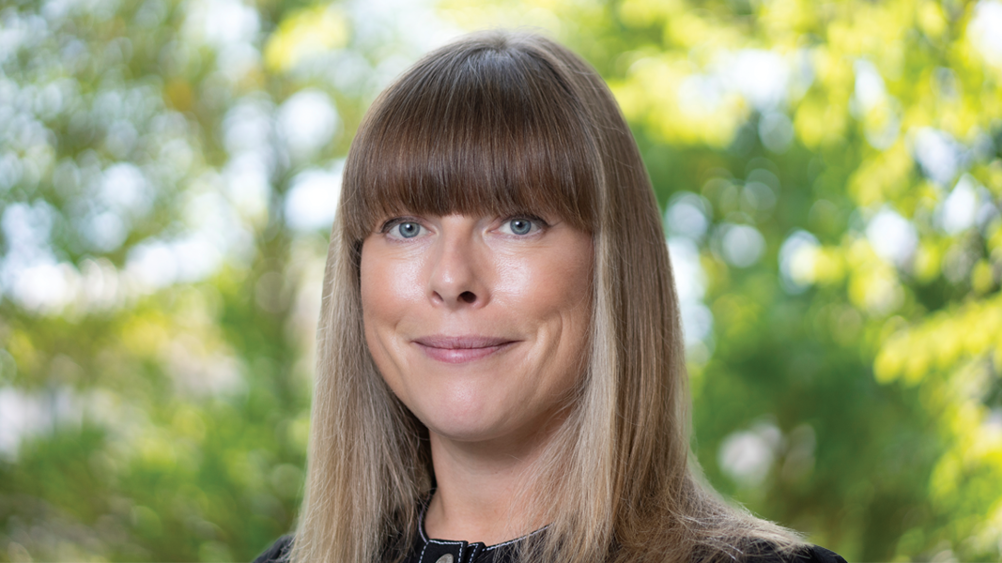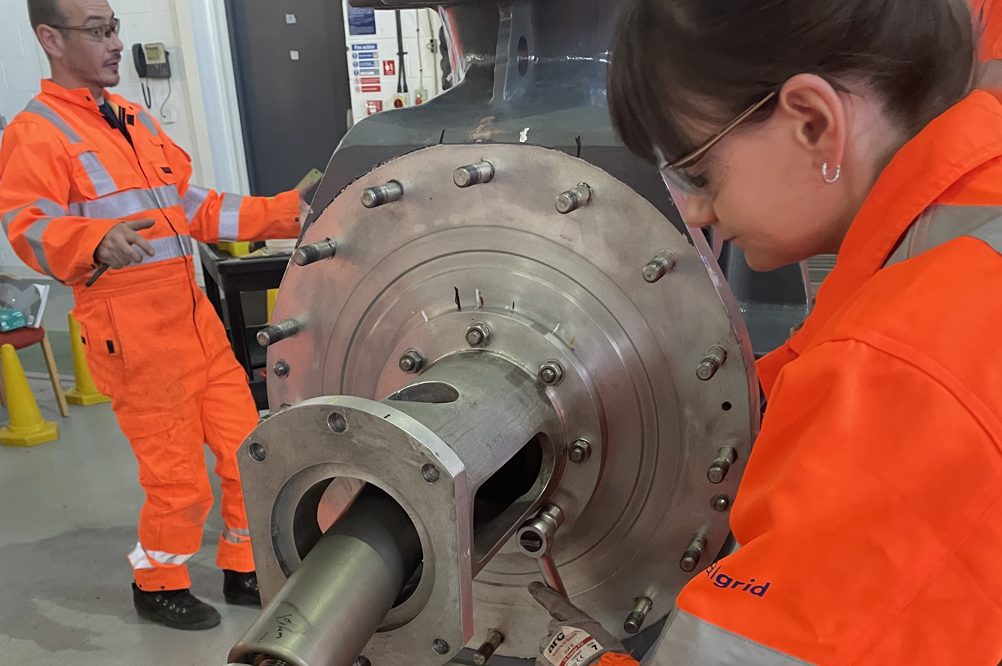Katie, who began her career as an offshore drilling engineer at Shell, is president of National Grid Ventures. In this role she oversees the development, financing, construction and operation of some of the company’s large-scale energy assets, including electricity interconnectors, wind and solar generation, and competitive transmission. Since 2022, Katie has been the chair of POWERful Women, the professional initiative to advance gender diversity within the energy sector.
Georgia, who started off her career in the police force in Nottingham, is currently undertaking an advanced apprenticeship, primarily working at National Grid’s IFA 2 interconnector, in the south of the UK.
Georgia: What do you think the engineering profession could do to encourage greater gender representation?
Katie: Sharing stories of women in rewarding engineering roles can demystify the perception that engineering is not for girls.
I also think both the energy sector and engineering profession need to do more to challenge the idea that some young people may have of engineering as a slightly boring and staid field. This is in comparison to other sectors like tech, which are perceived to be more exciting and cutting edge. There’s a whole host of fascinating opportunities in energy from the work on interconnectors that you do Georgia, to all the really interesting technical developments that are being made to drive the net zero transition and the profession should do more to highlight this to young people.

I also think its really important to challenge the industry and POWERful Women, an organisation that I’ve chaired since 2022, does a lot of great work in this space to report on gaps in representation and identify how they can be addressed. For example, we worked with industry to create the Empower Her in Energy marketing campaign to attract young women to a career in the industry.
Katie: What advice would you give to any girls or young women considering a career in engineering?
Georgia: If you're passionate about engineering, you can absolutely achieve your career ambitions as a woman. I didn’t start my apprenticeship until I was 24, and outside of my maths GCSE and applied extended diploma, I didn’t feel like I had much of an academic background in STEM (Science, Technology, Engineering, and Mathematics). That hasn’t held me back much at all, and actually there were a bunch of other qualities that I hadn’t thought about which I can also bring to the table.
Katie: What inspired you to pursue your apprenticeship in the engineering field?
Georgia: I've always had a passion for problem-solving and teamwork, which led me to work in the police force initially. Ultimately, I found that career wasn’t for me, however, I realised that engineering could potentially provide the same fulfilment by hearing my partner - who has been a marine engineer in the Royal Navy for a number of years now - talk about the things he was doing as part of his course. This was amplified when I got my first car and my stepdad encouraged me to be hands-on in repairing and maintaining it. Eventually I decided that I could combine my passions for problem-solving, teamwork, and hands-on technical work in engineering.
Georgia: Likewise, what drove you to choose engineering as a career?
Katie: Similarly to you, my dad, who was an engineer, had an interest in fixing and taking things apart which he passed onto me. Around the same time I began my career I bought an old moped and my dad encouraged me to get involved with repairing and maintaining it myself. My family, especially those with science and engineering backgrounds, supported and encouraged me once I decided to pursue engineering. That’s why it’s disheartening to hear that some girls are made to feel engineering isn't for them. I believe it's important for the industry to understand why this perception exists and challenge it.
Georgia: Your degree was in biology, but you started your career as in offshore drilling engineering in oil and gas. How did that happen?!?
In many ways that job, for me, was not too dissimilar from an apprenticeship in that I learned practical aspects on the job while studying technical elements on the side. I really enjoyed the problem solving in the role and loved the fact that the work I was doing has a practical impact on people’s lives. This passion has been a driving force for me in every role I’ve done throughout my career.
Katie: Were there any female role models, either in your personal life or your education, or outside in the wider world that inspired you when you were making your choice?
Georgia: Although I had inspirational female role models in my family in fields like law and nursing that I looked up to, none were in engineering. It was actually the men in my personal life who were the most crucial in encouraging me to pursue my current apprenticeship.

Since starting my role here at National Grid, however, a lot of senior female colleagues have reached out, to share their experiences and to offer advice and support, and I’ve found this encouragement really valuable.
Georgia: How has the engineering profession and its attitudes towards women changed since you started in your career?
Katie: The most fundamental change I’ve seen is that there are more women in technical and leadership roles now than when I started. Recent stats published by POWERful Women reveal that theproportion of women working in the most senior roles on UK energy company boards in 2024 has increased almost three-fold since 2014, but there's still work to be done to get to gender parity. I’ve also noticed greater buy-in from male colleagues and the profession in general on the value that women and greater gender diversity can bring.
One of the tangible changes I noticed early in my career, was the recognition from male colleagues that my presence as the only female engineer in the team had positively changed the dynamic of the team – away from one that could at times in the past feel excessively “macho”.
Katie: Do you think that having female role models is important for inspiring more girls and young women to come into engineering?
Georgia: I do think it’s important for women to see other women in engineering. I like to visualise where I want to be in my future career and seeing other women in the kinds of positions that I’d like to aspire to really helps.
Likewise, I wanted to ask what impact having female role models had on you in the earlier stages of your career?
Katie: I agree that it’s hugely important. I have two children and one of the things that was really important for me, that wasn’t as prevalent back earlier in my career, was to see women who were very senior in their careers who managed to balance this with having families. Having those kind of role models front and centre can really help other women who do have this ambition, that it’s possible to achieve.
Katie: What are your hopes for your future career?
Georgia: In the immediate future I’d like to complete my apprenticeship, for which I’m currently in my final year. Beyond that, I would very much like to pursue further learning in the field and potentially get a degree in engineering, as well as gaining more practical experience on sites.











McMurtry Spéirling defies gravity using fan downforce
Ground effect fans were banned from competitive motorsport from the end of the 1978 season following the introduction of Gordon Murray's Brabham...